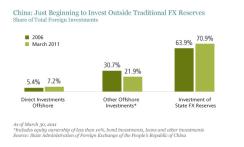Many Americans fear that China may curtail its buying of Treasury bonds, which could drive up interest rates and slow economic growth. But less Chinese investment in Treasuries might be a blessing in disguise―if the funds were redeployed in more US equities and direct investments in companies or real assets. Ultimately, I think that such Chinese investment in the US will be good for both countries.
China would benefit, because expanded foreign investment would allow it to participate more widely in the global economy and acquire local distribution, manufacturing and marketing presences in other markets. Rising wage pressures at home are also an impetus for it to expand investment worldwide. Much of this activity is in the US, because China has a vast store of US dollars from its massive trade surplus with the US.
The US would benefit, because the Chinese evaluate acquisitions based on long-term considerations. This could spark the repricing of many extremely undervalued companies and initiate a potent cascading effect. Stepped-up Chinese investment in the US (and elsewhere) could be the catalyst for unleashing pent-up demand and capital spending. The companies that Chinese entities buy would benefit first, but ultimately, this process may energize the US economy and capital markets.
Of course, this is just a nascent development. In the five years from 2006 through 2010, China invested only about $215 billion in companies worldwide, versus current sovereign reserves in excess of $3 trillion. The lion’s share of that sum (far more than is necessary) was used to finance trade imbalances and manage foreign-currency positions (Display). While change is coming, the process is slow.

Most often, Chinese sovereign wealth funds, such as the China Investment Corporation, make investments of less than 10% in foreign companies. They also make direct investments, sometimes acquiring whole companies.
China, like Japan before it, may find that many deals receive a cold reception. Remember the attempted purchase of California’s famed Pebble Beach Golf Links by two different Japanese acquirers? The saga began in 1990, and ended with US entities buying the golf course back. At the risk of oversimplifying this complicated bit of financial history, Americans wanted their storied golf course. Nonetheless, Japanese firms continue to build manufacturing plants in the US and around the world, in part to guard against protectionist attempts to limit their exports, as well as to hedge their currency exposures.
Reaction to increased Chinese investment may be even more intense, since most often the buyers are entities owned or controlled by the government. For example, the China National Offshore Oil Corporation’s attempt to buy Unocal in 2006 was dropped after a political uproar. Mutual distrust between governments, US skittishness about letting China in and China’s statist speed bumps remain important impediments to Chinese foreign investments.
Nevertheless, as long as China is willing to invest on the basis of expected long-term returns, it may help reduce the risk aversion and short-term focus in the US and global markets today. I’d view that as a very healthy development.
The views expressed herein do not constitute research, investment advice, or trade recommendations and do not necessarily represent the views of all portfolio-management teams at AllianceBernstein.
Vadim Zlotnikov is Chief Market Strategist at AllianceBernstein






